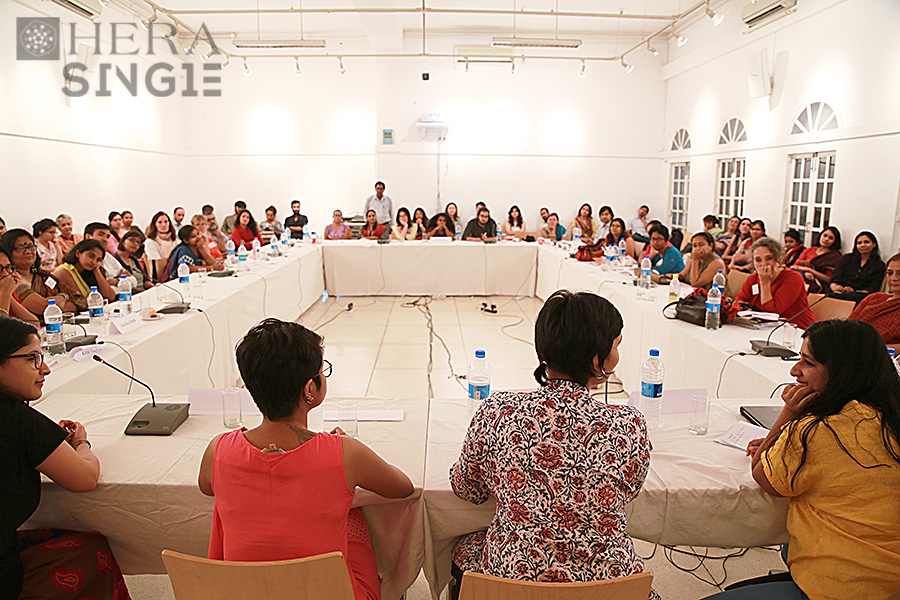
Report on the HERA-SINGLE workshop in Delhi “Solo-cities: Representations of the ‘Single’ in Urban Spaces”, October 6-8, 2015.
From October 6th – 8th 2015, the HERA SINGLE Team hosted the workshop “Solo-Cities: Representations of the ‘Single’ in Urban Spaces”, in co-operation with the Goethe Institut/Max Mueller Bhavan in Delhi.
The aim of the workshop was twofold: to collaborate with scholars and artists who work on singlehood and/or urban space; and to interact with a wider public through events such as film screenings and discussion forums. The participants’ presentations, debates and screenings all revolved around contested notions of singleness, focusing on changing gendered imaginaries and representations in and of the city.
The workshop started with a keynote lecture by the Delhi-based anthropologist Sanjay Srivastava who addressed discourses of Indian middle-classness, urbanism, ideologically motivated notions of moral consumption and its implications for gendered subjectivities in Indian cities. These ideas were picked up by presenters in the panels the following day, sharing insights into urban women’s experiences in different public and private spaces. Penn IP spoke about rural-urban migrant women in Shanghai’s service sector and their ideas of home and belonging. Spatial autonomy and place-making practices of young women in Delhi’s creative industries were the focus of Lucie Bernroider’s talk. Paromita Chakravarty discussed the ambivalent nature of hostels in Kolkata that construct ideologies of singleness and reaffirm ‘traditional’ family structures, but also function as a liberating environment for young women.
The artists Sreejata Roy and Sheba Chhachhi both discussed the power of art in facilitating women’s claims to public space. Sreejata introduced her work at the Khoj Project in Delhi’s urban village of Khirki, where she encourages female children in this predominantely male-dominated environment to express their right to the city through street art. Feminism, art and urban protest in Delhi from the 1980s up to today was the topic of Sheba Chhachhi‘s presentation. The artist demonstrated her visual translations of the Indian women’s movement protests into photography and installation artworks. The focus on representation was explored further in the first of our film screenings, “Where’s Sandra” by Paromita Vohra. The filmmaker was joined by the scholars Ranjani Mazumdar (Cinema Studies, JNU Delhi) and Aparajita De (Postcolonial and Cultural Studies, Department of Geography, Delhi School of Economics), for a panel discussion on single women’s depiction in cinema.
Our second keynote lecture, delivered by Lucetta Kam Yip Lo (Hong Kong) who spoke on queerness, mobility and the interdependent transformative connection between city and body, set the context for the panels on Day Three, which focused on women’s mobility, sexuality and intimacy. Maddalena Chiellini presented her research on the aspirations and motivations of female taxi drivers and bikers in India’s capital. Singapore-based Jenifa Zahan’s paper explored the labour migration of lower middle class North-eastern women to Delhi and their discrimination in public and media discourse. Female sexuality, safety and surveillance in the aftermath of the December 2012 Delhi gang rape was Brinda Bose’s subject of enquiry. Chenying PI introduced us to the Shanghai “Love Club” where urban single women and men are trained in how to find a partner. It was argued that such places represent the contemporary therapeutic culture of self-improvement inherent in consumerism.
The panels were followed by two public events: “The Urban Toolbox” was aimed at students from interdisciplinary backgrounds, and provided an overview of contemporary urban research methods. This was followed by the final keynote lecture from geographer Gillian Rose. An expert in visual methods, Gillian presented her recent work on the use of digital technologies in architecture to produce imaginaries of ideal urban spaces. Our final screening incorporated three short films by the young Indian filmmakers Oindrila Duttagupta, Shilpi Gulati and Shaheen Ahmed. The directors engaged in a podium discussion led by feminist Nisha Susan, founder of the ‘Consortium of Pub-Going, Loose and Forward Women’ that launched the “Pink Chaddi Campaign” to protest against moral policing by Hindu Nationalists.
LINKS:
An article on Sreejata Roy’s project on art and public space in Khirki/ Delhi on Nisha Susan’s feminist website Ladyfinger:
http://theladiesfinger.com/khirki-art/
An interview by Boom News with filmmaker Paromita Vohra on feminism:
https://www.youtube.com/watch?v=tax8q0hJcEQ
Shilpi Gulati’s short film “ Inside Out”:
https://www.youtube.com/watch?v=7_QynRZICxo